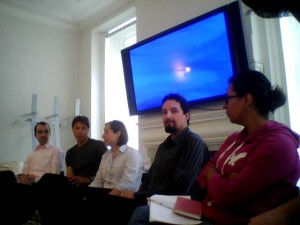Heather started off the discussion by asking Dean about experts. Dean argued that relationships determine who gets called an expert and who doesn't. For example, a local community NGO in Sri Lanka is treated as the "community" by their
World Bank partner, but when that NGO goes into the community, they are considered experts.
Juan pointed to how Lizzie was included in the ESJP discussion and why she was included but not a rep from Proctor & Gamble. Donna replied that it's Lizzie's willingness to critique EWB-Oz as opposed to P&G. Donna added that she's conflicted about EWB, particularly the EWB-USA chapter she's had some experience with. Caroline added that she, too, was conflicted about her "Waste for Life" project but she's sick of just talking about justice and not doing something about it.
Juan asked the group if we're willing to engage corporate/industry folks if they self-critique. Caroline/Donna said absolutely. Eric countered by pointing out how industry can't sell critique and if ESJP engages with industry on this level, we will compromise our principles of critique. He further asked the audience if it is possible for corporate/industry to ever care about social justice?
Dean added that a person situated in a corporation who's interested in social justice and can self-critique can come to ESJP but as a person not as a representative of the corporation.
Caroline added that ESJP can serve as a place for critiques/discussion of development work. Lizzie mentioned that she might have misframed her presentation. However, audience members countered that there are ways to work with justice within certain constraints/boundaries and outside them as well (but both are important).
Parting question of the session: can the state engage with social justice as well?

